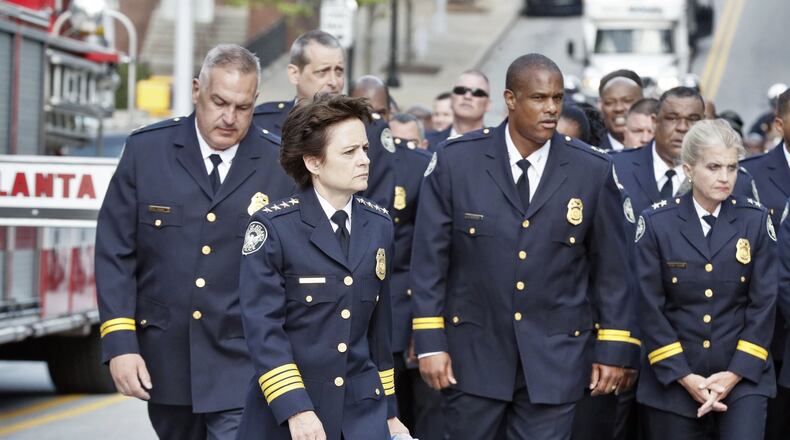Growing attrition rates that have left the force 300 officers below capacity. Crime trending up. And the Super Bowl returning for the first time in 18 years.
Facing what was rapidly becoming a crisis for Atlanta’s police department, Mayor Keisha Lance Bottoms, on Monday announced a substantial boost in pay for the city’s 1,700 cops
The increase — 30 percent over the next three years — will, for the first time in the department's recent history, make officer wages competitive with other agencies in the region and in similarly sized urban centers nationwide.
RELATED:
Bottoms, who framed the issue as one of public safety, acknowledged Monday that a pay raise was long overdue.
“It is time for the city of Atlanta to take care of those who take care of us, which is why our administration will immediately get to work to provide Atlanta’s officers with the compensation they deserve,” Bottoms said Monday.
The move comes after a recent compensation study, commissioned by the Atlanta Police Foundation, found that the city’s police are paid below the median rates of their law enforcement peers, with a lower floor, lower ceiling and a longer wait to advance from the bottom to the top.
The consequences had become impossible to ignore. Though crime overall is down slightly from this time a year ago, murders are up 18 percent and auto thefts, 9 percent. Struggling to recruit and retain officers, the department has turned to overtime to keep shifts filled. A recent audit found that police had racked up millions of dollars in overtime costs.
“By addressing pay, you are making the city safer,” said APD Chief Erika Shields, who will be tasked, along with police foundation CEO Dave Wilkinson, with figuring out the best way to distribute the approximately $30 million earmarked for police salaries over the next three years — $10 million annually, starting in January and continuing through 2021.
APD officers received about 20 percent less than what peers made working in 10 comparable national markets and four state and local agencies, a disparity that held through the rank of lieutenant, the compensation study found.
The gap was even higher in median pay for officers. APD’s, at $45,423, was about $6,000 below Alpharetta and $10,000 less than Sandy Springs and Brookhaven.
“The impact will be immediate,” Wilkinson told The Atlanta Journal-Constitution. The top priority will be tackling attrition; according to the police foundation, for roughly every 100 officers hired, 200 are leaving each year.
“The mayor’s commitment sends a strong signal to our officers that they’re appreciated, that we value them,” he said.
That has not always been the case. Tensions between cops and City Hall reached a boiling point in 2015, when then-Mayor Kasim Reed, with the City Council’s backing, excluded public safety officers from raises awarded to roughly 3,000 other city employees. It was payback after the police and fire unions’ joined a class-action lawsuit challenging the mayor’s 2011 pension reform proposal.
Reed defended his decision, citing four previous pay hikes since 2010. But they were incremental — 3 percent in 2010, 3.5 percent the following year — and turnover was increasing. Union leaders with the local International Brotherhood of Police Officers claimed 45 percent of officers hired between 2005 and 2013 had left the force.
At the same time Reed was determined to fulfill his promise of a police force 2,000 officers strong, a goal reached in 2013. But it was yardstick that became impossible to maintain, and as of Oct. 1 APD had 309 vacancies.
Wilkinson said the pay raises will allow for 2,000 officers, and perhaps more by the next decade. That can be achieved by reversing the attrition rate, he said, hiring 200 to 250 officers for every 100 who leave on an annual basis.
By January, the starting pay for officers should rise from $41,000 to the mid-$40,000 range, he said, comparable with Dunwoody and Sandy Springs police.
“Within three years we’ll be on the level with other police departments in the region,” Wilkinson said.
By then, “no one’s going to be leaving us for another job in law enforcement because of pay,” he said.
AJC staff writer Stephen Deere contributed to this article.
BY THE NUMBERS:
A 30 percent pay raise, to be implemented over the next three years, marks Atlanta’s most substantial investment in police salaries in decades, if not ever.
» A 2003 study by PolicePay.net Inc., a financial consulting firm for police unions, found APD’s starting salary, at $32,783, was ranked 170th among the country’s 200 largest cities.
» In 2015, Mayor Kasim Reed excluded public safety officers from a citywide pay raise, citing their involvement in a lawsuit against his proposed pension reform. “If they’re planning to get a pay raise while they’re suing me, they’re going to have to wait for somebody else to have my job,” Reed said at the time.
» By 2018, APD officers, from new hires to seasoned vets, were making well below their peers in departments both locally and nationwide. Recruits are currently paid a flat $34,726, about $8,000 less than Sandy Springs recruits make. Nationally, Nashville recruits average about $6,000 more and in Seattle, the median recruit pay is $58,902.
Source: Atlanta Police Foundation compensation study
About the Author
Keep Reading
The Latest
Featured





